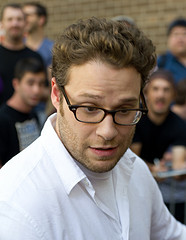Share This Article:
Return to Silver Screen Central Home page


Seth Rogen reflects on his drug trip in The Night Before
B-Moviegoers this holiday season have already had the opportunity to see the umpteenth version of the prototypical Christmas get-together film, Love the Coopers. Now, they get to see a most non-prototypical Christmas get-together movie, The Night Before, a film that has far more Seth Rogen than jolly St. Nick.
Rogen plays Isaac, who along with best buds Ethan (Joseph Gordon-Levitt) and Chris (Anthony Mackie) meet every Christmas Eve and visit the same places they did since they were teenagers. This year will be their last go-around, since Isaac’s wife Betsy (Jillian Bell) is expecting her first child and Chris’s NFL career is taking up too much of their time. But Ethan gets tickets to the best Christmas Eve party of all time, the legendary Nutcracker Ball, and the three friends plan to end their evening there. Of course, they run into numerous detours along the way.
Director Jonathan Levine and a host of writers, including Rogen’s comedy partner Evan Goldberg try to blend Rogen’s usual crudities with a sentimental Christmas movie and mostly succeed. Much of the crudity comes from an early Christmas present Betsy gives Isaac, a box filled with seemingly every drug known to man. When the drug jokes work, as when Isaac imagines the statues in a manger scene talking to him, The Night Before is hilarious. But Levine hasn’t mastered the art of keeping cutups like Rogen and James Franco (who plays himself in a cameo) under control, so some of the crudity simply falls flat and, worse, keeps going on anyway. Yet once the audience gets past the sex and drug jokes, The Night Before is, at heart, an often sweet bromance about three 30-something manchildren who finally realize they need to act like adults. Isaac has his fatherhood issues, Chris needs to address his steroid use and the impending end of his pro career, and Ethan must get over his fear of commitment that sabotaged his relationship with Diana (Lizzy Caplan), his ideal woman. Along the way, the guys do get some guidance from a most unlikely source, a scene-stealing drug dealer from their youth, played by Michael Shannon. The film’s attempts to mix raucous humor and the gentler moments don’t always work, but, with the help of a solid ensemble cast, The Night Before winds up being a pleasant holiday surprise.
Continue reading on The Night Before: Mini-review




Recent Comments